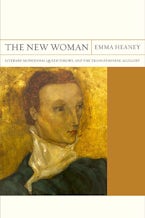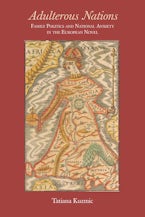LITERARY CRITICISM / Subjects & Themes / Women
Showing results 1-7 of 7
Filter Results OPEN +

Loss, A Love Story
Part memoir, part imagined history, this unique personal essay depicts the intimate experience of childhood bereavement, lost love affairs, and the complicated realities of motherhood and marriage.
The Virginal Mother in German Culture
Lauren Nossett’s The Virginal Mother in German Culture explores the contradictory obsession with female virginity and idealization of maternal nature in Germany from the late eighteenth to the early twentieth century.
Fair Rosamond
VIRGIL BARNEY HELTZEL (1896–1976) received an M.A in English from Harvard University in 1920, and a PhD from The University of Chicago in 1925 after serving in the U.S. Army from 1917–1919. He taught in the English Department at Northwestern University where he remained until his retirement as a professor of English in 1962
The New Woman
Emma Heaney’s The New Woman: Literary Modernism, Queer Theory, and the Trans Feminine Allegory traces the evolution of the “trans feminine” as an allegorical figure from its origins in the late nineteenth century to contemporary Queer Theory.
Intimate Relations
In Intimate Relations Krupa Shandilya focuses primarily on social reform movements that negotiated the intimate relations between men and women in Hindu and Muslim society, namely, the widow remarriage act in Bengal (1856) and the education of women promoted by the Aligarh movement (1858–1900).
Adulterous Nations
In Adulterous Nations, Tatiana Kuzmic enlarges our perspective on the nineteenth-century novel of adultery, showing how it often served as a metaphor for relationships between the imperialistic and the colonized.
Spoiling the Stories
Spoiling the Stories by Tamar Merin is based on the theoretical idea of intersexual dialogue, a term that refers to the various literary strategies employed by Israeli female fiction writers expressing their voice within a male-dominated and (still) inherently Oedipal literary tradition.

Loss, A Love Story
Part memoir, part imagined history, this unique personal essay depicts the intimate experience of childhood bereavement, lost love affairs, and the complicated realities of motherhood and marriage.
The Virginal Mother in German Culture
Lauren Nossett’s The Virginal Mother in German Culture explores the contradictory obsession with female virginity and idealization of maternal nature in Germany from the late eighteenth to the early twentieth century.
Fair Rosamond
VIRGIL BARNEY HELTZEL (1896–1976) received an M.A in English from Harvard University in 1920, and a PhD from The University of Chicago in 1925 after serving in the U.S. Army from 1917–1919. He taught in the English Department at Northwestern University where he remained until his retirement as a professor of English in 1962
The New Woman
Emma Heaney’s The New Woman: Literary Modernism, Queer Theory, and the Trans Feminine Allegory traces the evolution of the “trans feminine” as an allegorical figure from its origins in the late nineteenth century to contemporary Queer Theory.
Intimate Relations
In Intimate Relations Krupa Shandilya focuses primarily on social reform movements that negotiated the intimate relations between men and women in Hindu and Muslim society, namely, the widow remarriage act in Bengal (1856) and the education of women promoted by the Aligarh movement (1858–1900).
Adulterous Nations
In Adulterous Nations, Tatiana Kuzmic enlarges our perspective on the nineteenth-century novel of adultery, showing how it often served as a metaphor for relationships between the imperialistic and the colonized.
Spoiling the Stories
Spoiling the Stories by Tamar Merin is based on the theoretical idea of intersexual dialogue, a term that refers to the various literary strategies employed by Israeli female fiction writers expressing their voice within a male-dominated and (still) inherently Oedipal literary tradition.







